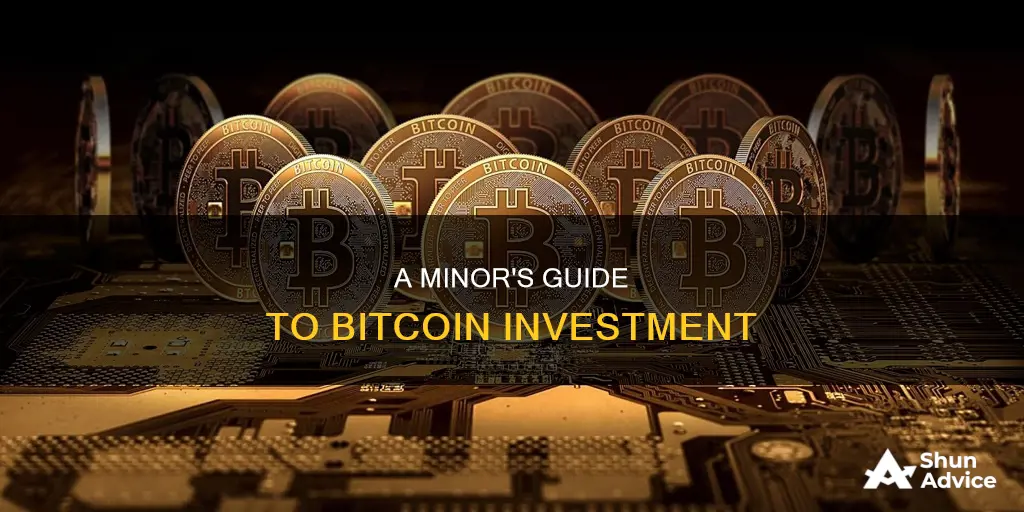
Investing in Bitcoin can be a great way for minors to learn about digital transactions, blockchain, crypto wallets, and distributed ledger technology. While there is no minimum age to use cryptocurrency, most regulated crypto apps and exchanges require users to be at least 18 years old. So, how can minors invest in Bitcoin?
One option is for parents to open a custodial account on behalf of their child. This allows parents to invest in their child's future while maintaining control of the account until the child reaches the age of majority. Another option is for minors to use a decentralised exchange, which does not require user verification and allows them to trade cryptocurrencies directly on the blockchain. Additionally, minors can earn crypto through freelance work or by using crypto apps. It is important to note that investing in cryptocurrency is risky and minors should never invest more than they can afford to lose.
| Characteristics | Values |
|---|---|
| Age restrictions | Many popular crypto exchanges have age restrictions and do not allow users under 18 to sign up and trade cryptocurrencies. |
| Recommended exchanges | Bybit, MEXC, Weex, KuCoin, Margex, PrimeXBT, Bisq |
| Legal considerations | In most countries, there is no specific law making it illegal to buy crypto when under 18. |
| Advice for minors | Speak to your parents or guardian about any investments you make. Do your own research, and never invest more than you can afford to lose. |
| Crypto apps for kids | EarlyBird, Step |
| Crypto wallet | There are no age limits for self-controlled crypto wallets, but wallets that are part of a regulated crypto exchange are limited to users who are at least 18 years old. |
What You'll Learn

Crypto accounts for minors
There is no minimum age requirement to own cryptocurrency. However, most major crypto platforms, including traditional brokerage firms, won't allow minors to buy crypto. Therefore, minors will need the help of a parent or guardian to set up a crypto investment account.
From a diversification perspective, crypto could be an excellent long-term investment for minors. However, it should be part of a well-rounded portfolio, with most experts recommending that crypto constitutes no more than 5% of the total.
When minors invest in crypto, they can improve their financial literacy and invest for their future. They can also learn about blockchain technology, depending on their age. Crypto can be a great way for children to learn about financial markets and the concept of risk and reward with investments.
Opening a Crypto Account for Minors
Yes, it is possible to open a crypto account for a minor if it is a custodial account, joint account, or another type of account that allows the minor to earn crypto without directly buying it. Minors cannot buy, sell, or trade securities. However, a parent or custodian can buy crypto on their behalf or allow them to earn crypto without purchase.
How to Open a Crypto Account for Minors
- Decide on the type of investment account: Custodial accounts typically hold securities like stocks or mutual funds, while Uniform Transfers to Minors Act (UTMA) accounts can also hold real estate and other investments. Custodial accounts may support cryptocurrencies, including Bitcoin and Ethereum.
- Open a crypto wallet: You can open a crypto wallet for a minor through a custodial account with platforms like EarlyBird, which offers a crypto wallet for Ethereum and Bitcoin.
- Submit an application: Provide basic identification information about the minor, such as their birthday and Social Security number, along with your own information. Fund the account with fiat currencies, such as US dollars or euros.
Other Ways for Minors to Acquire Crypto
If you're looking for alternatives to opening a crypto account for a minor, here are some options:
- ATM machines: Minors can buy and sell crypto through Bitcoin ATMs, which are available worldwide. While there may be transaction charges, this method does not require account verification unless a certain threshold is exceeded.
- Decentralized Exchanges (DEXs): Platforms like Bisq, HodlHodl, and Localcryptos.com are decentralized exchanges that allow anonymous trading without KYC verification.
- Freelancing: Minors with skills like software development or content writing can offer their services on crypto-focused freelance websites and earn Bitcoin payments.
- Gift Cards: Minors can buy gift cards (iTunes, Amazon, Google Play, etc.) and exchange them for Bitcoin on platforms like Paxful.
- Exchanges with Lenient KYC Regulations: Some exchanges, like KuCoin and Binance, have lenient Know Your Customer (KYC) regulations for users trading small amounts of crypto. However, a credit or debit card from a parent or guardian may be needed.
The Tax Implications of Bitcoin Investments
You may want to see also

Crypto ATMs
Most crypto ATMs only offer one-way transactions, meaning that crypto can be purchased but not sold. However, some crypto ATMs offer two-way transactions, allowing users to buy and sell crypto in exchange for cash.
- Sign up for a digital wallet. Crypto ATMs connect to your digital wallet to facilitate the transaction, so you will need one to purchase crypto.
- Find a crypto ATM. You can use a service like Coin ATM Radar or a simple Google search to locate a crypto ATM near you.
- Verify your identity. Most crypto ATMs will need a phone number to verify your identity, but some may require further verification, such as scanning a photo ID or entering your Social Security number.
- Scan your wallet. To buy Bitcoin or another cryptocurrency, you will need to scan your wallet address. Most digital wallets can display a QR code, which can be scanned into the crypto ATM.
- Make a purchase. Select the crypto you wish to purchase, choose how much to pay, and complete the transaction. You will need to deposit cash or pay using another accepted payment method.
- Wait for the transaction to complete. Transactions take place on the blockchain and can take a while to process. Once the funds have been deposited into your wallet and confirmed, the transaction is complete.
It is important to note that crypto ATMs charge high fees for transactions, with fees averaging around 15% per transaction. These fees may include a crypto exchange fee, cash exchange fee, or card processing fee (if using a debit card). Therefore, it is essential to compare the fees of a crypto ATM with those of a traditional cryptocurrency exchange (typically 1% to 4%) before using one.
Calculating Your Bitcoin Investment's Average: A Simple Guide
You may want to see also

Decentralised exchanges
Decentralized exchanges (DEXs) are peer-to-peer marketplaces where cryptocurrency traders make transactions directly without handing over management of their funds to an intermediary or custodian. These transactions are facilitated through the use of self-executing agreements written in code called smart contracts.
DEXs were created to remove the requirement for any authority to oversee and authorize trades performed within a specific exchange. Decentralized exchanges allow for peer-to-peer (P2P) trading of cryptocurrencies. Peer-to-peer refers to a marketplace that links buyers and sellers of cryptocurrencies. They are usually non-custodial, which means users keep control of their wallet's private keys. A private key is a type of advanced encryption that enables users to access their cryptocurrencies. Users can immediately access their crypto balances after logging into the DEX with their private key. They will not be required to submit any personal information like names and addresses, which is great for individuals who value their privacy.
DEXs use smart contracts to automate the trading process. When a user wants to trade one cryptocurrency for another, they send their assets to a smart contract. The smart contract then matches buy and sell orders and executes the trade automatically when the conditions are met, all while keeping custody of the assets within the users' wallets.
Popular DEXs include Uniswap, SushiSwap, PancakeSwap, Bisq, HodlHodl, and Localcryptos.com.
There are several advantages to using a DEX:
- Vast variety: DEXs offer a virtually limitless range of tokens, from well-known to random.
- Hacking risks can be reduced: As all of the funds in a DEX trade are stored on the traders' own wallets, they are theoretically less susceptible to hacks.
- Anonymity: No personal information is required to use most popular DEXs.
- Utility in the developing world: The peer-to-peer lending, speedy transactions, and anonymity made possible by DEXs have made them increasingly popular in developing economies.
However, there are also some disadvantages to using a DEX:
- Trickier user interfaces: Navigating decentralized exchanges requires some specialized knowledge, and the interfaces are not always easy to use.
- Smart contract vulnerability: Any DeFi protocol is only as secure as the smart contracts that power it, and code can have exploitable bugs.
- Riskier coins: With the unvetted, vast array of tokens available on most DEXs, there are also a greater number of scams and schemes to be wary of.
Cashing Out Your Bitcoin: Strategies for Profitable Withdrawals
You may want to see also

Freelancing for crypto
Freelancing is a great way to earn cryptocurrency, especially if you are a minor. There are many new crypto-focused freelance websites that allow their users to send and receive payments in digital currency. Some of these platforms also offer safe Bitcoin escrow services to ensure honest transactions.
Crypto-Focused Job Boards
Websites like CryptoTask, Pompcryptojobs, and CryptoJobs match service providers with clients who pay in Bitcoin. To get started, create an account and advertise your services. You can also browse job postings by employers looking for freelancers.
Facebook Groups and Subreddits
You can post your job offering in Facebook crypto groups or regular job-seeking groups, specifying that payment should be in crypto. There are often job postings by employers as well.
Freelance Platforms
Platforms like Upwork and LaborX offer a wide range of job categories, including those related to cryptocurrency and blockchain technology. These sites allow you to set up a profile, browse jobs, and apply for them.
Develop Your Skills
If you have skills such as software development, web development, web design, video editing, content writing, or virtual assistance, you can offer these services in exchange for cryptocurrency.
OTC Method
The over-the-counter (OTC) method allows you to buy Bitcoin without verification. You can find reliable Bitcoin brokers online through Facebook forums, Reddit, or other peer-to-peer groups. However, always do your due diligence to avoid scams.
Remember, if you are a minor, it is important to speak to your parents or guardian about any investments you make and never invest more than you can afford to lose.
Bitcoin: Long-Term Hold or Short-Term Investment Gamble?
You may want to see also

Crypto gift cards
If you are a minor, you can ask your parents or guardian to help you open a crypto investment account. Minors cannot buy, sell, or trade any type of securities, but a parent or custodian can buy crypto on a child's behalf. Alternatively, some apps let kids earn crypto.
One way for minors to acquire cryptocurrency is through crypto gift cards. Gift cards are a great method because, at no point, will you have to answer questions regarding your age. You can buy gift cards with crypto from brands like Amazon, eBay, Netflix, iTunes, and thousands of other stores.
- Bitrefill: You can purchase gift cards from over 5,000 retailers, including Amazon, Apple, Walmart, Steam, and Google Play. Bitrefill supports various cryptocurrencies such as Bitcoin, Ethereum, Litecoin, Dogecoin, and more.
- Coinsbee: With Coinsbee, you can buy gift cards from over 3,000 brands in 185+ countries using 200+ cryptocurrencies, including Bitcoin, Ethereum, and Litecoin. You can also buy prepaid credit cards like Visa, Mastercard, or American Express with crypto.
- Cryptorefills: Cryptorefills offers gift cards from popular brands like Amazon, Apple, Home Depot, Uber Eats, and more.
The Ultimate Guide to Investing in Bitcoin Code
You may want to see also
Frequently asked questions
There is no minimum age to use or invest in Bitcoin or other cryptocurrencies. However, most major crypto platforms and exchanges require users to be at least 18 years old.
Minors can get help from their parents or guardians to set up a crypto investment account. This can be done through a custodial account, joint account, or other types of accounts that allow the minor to earn crypto without directly buying it. Additionally, some apps and exchanges allow minors to buy, sell, or earn crypto with parental consent.
Crypto investing is considered high-risk and mostly unregulated. There is a chance of significant price fluctuations, regulatory uncertainty, and a higher risk of fraud compared to other assets. Minors should only invest what they or their parents are willing to lose.
There are other speculative investments that can provide diversification, such as real estate investment trusts (REITs), precious metals like gold, and collectibles like baseball cards or artwork. These options may offer a way to invest with potentially lower risks than cryptocurrencies.







